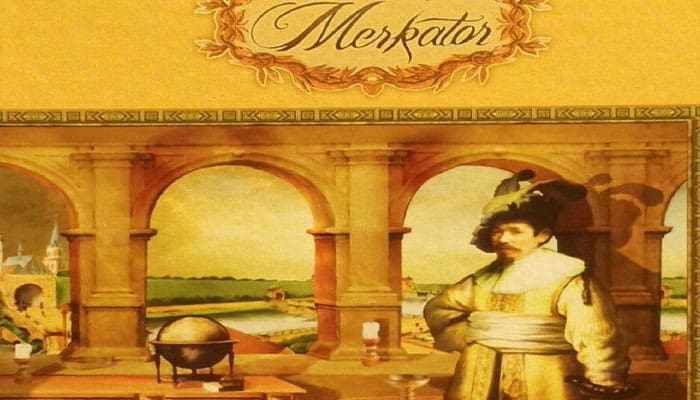
1618 - 1648: thirty years of war throughout Europe. The Hanseatic city of Hamburg, ever a center of commerce, is booming. Her merchants deal with all warring parties: here the Catholics, supporting the Emperor; there the rebellious Protestants.
You are one of those merchants. On your travels throughout Europe, you collect and deliver goods to fulfill your contracts. Your rewards are additional, more lucrative contracts that can be used or sold.
If you are efficient, you can also save back time which can be spent during other players' turns to join their travels and fulfill even more contracts. Who will be the player with the best trade network?
Components

- 1 rulebook and 1 game setup sheet
- 2 game boards
- 4 office boards
- 4 scoring overview tiles
- 4 supply tiles
- 1 time chart
- 1 white Merkator token
- 16 Bonus cards
- 26 Building cards
- 78 Contracts
- 320 wooden cubes
- 66 cardboard tiles
Setup
Punch out the overview cards and assemble the sorting boxes. Both parts of the game board are placed next to each other, and the colored boxes are put in the respective slots. Sort the wooden cubes by color and put them into the boxes.
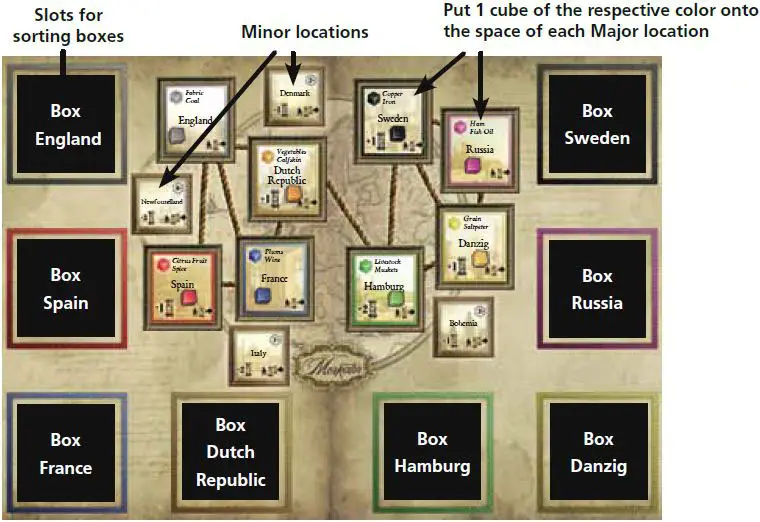
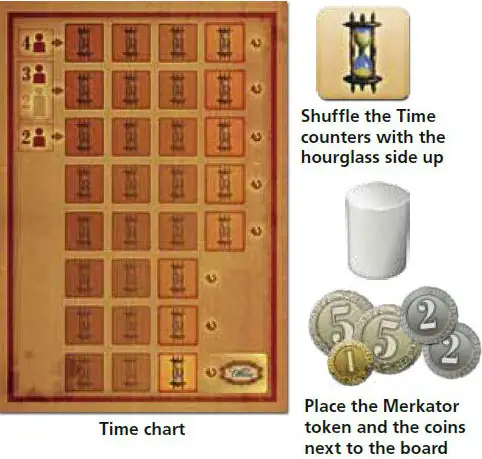
Use the ULTIMO side of the time chart and put it next to the game board. Depending on the number of players, fill it with Time counters:
- with 4 players, all rows are filled
- with 3 players, the top row is left empty
- with 2 players, the two topmost rows are left empty
The remaining Time counters are put in the sorting box, unsorted.
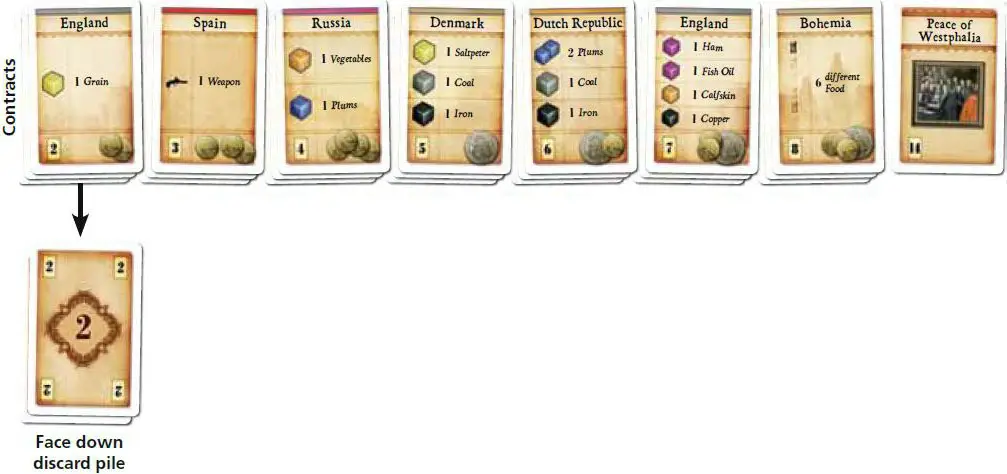
-
Sort the Contracts by their value (lower left corner or card back) and shuffle those stacks. Deal all players four Contracts: one of value 2, 3, 4 and 5 each. Place all stacks face-up.
-
Turn the remaining value 2 Contracts face down to form the discard pile. (Those value 2 Contracts will not be needed for the rest of the game).
-
Sort the Bonus cards by coin value (lower left corner) onto two piles. Shuffle those piles. All players get 1 card of each pile.
-
Shuffle the two piles together face down.
-
Place the top 4 Building cards face up next to the face-down stack.
-
Shuffle the Building cards face down.
-
Place the top 4 Bonus cards face up next to the face-down stack.
Game Play
Merkator is played in clockwise order.
The player who was last in Hamburg will be the starting player. In case of a tie, or if none of the players have ever been to Hamburg, the player who most recently ate a hamburger will be starting player.
The starting player gets no Time counters. The player sitting to his right gets 2 Time counters, and all other players get 1 Time counter from the supply 1.

Each player's turn consists of four steps that are played in order. There's a short turn overview on the players' office boards 2.

1. Investment
In this first step, the player has the opportunity to make investments. As long as the player has 5 Contracts or fewer, this is optional. If a player has 6 or more Contracts 3 at the beginning of the Investment Step, it is mandatory to sell some of them and to invest the revenue.
(This is called a forced Investment). The value of a Contract is shown on the card. When selling a Contract, the player gets that many Taler for it.
The player can invest in Bonus cards and/or Building cards 4.
Bonus cards help the player to collect additional goods. Building cards give Victory Points.

Players have a cash limit of 15 Taler. If they have more than that, they have to invest in Bonus cards and/or Building cards immediately or discard down to 15 Taler.
Any cards bought are placed face up next to the player's office.
Whenever a player buys a card, a new card of the same kind is immediately turned face up. There are always 4 cards of each kind in the open offer. The player then may buy another card, including the new card.
Sold Contracts are put on the face down discard pile.
The player may buy more than one card in this step.
The player must nou sell his last remaining Contract, as there is no way to obtain new Contracts other than fulfilling existing ones.
It doesn't matter if the sold Contracts were on the office board or next to it. All Contracts in a player's possession are equivalent.
2. Traveling
In this second step, the player chooses one of the 12 locations on the board and places the white Merkator token on that space 5. (The player doesn't have to move the Merkator token - the location can be the same the previous player chose).
A player traveling to Spain, Italy or Newfoundland has to pay Time counters for the travel 6 ; this cost has to be paid by the active player only, and not by other players joining him. If a player doesn't have enough Time counters for a destination, that player can't travel there.
Travelling is the most important mechanism in the game. It is merely outlined here.
The player takes all goods in that location plus bonus goods from Bonus cards of that location. The new goods are sorted onto the Storage (A-D) and Depots (E-F) spaces of that player's office.
The player places new goods on certain major locations.
The player eventually gets Time counters from the time chart
7or has to pay some.If one of the Time counters taken from the time chart is the last of the row, a loss-of-goods check is made.

3. Fulfill Contracts
In this third step, the player can fulfill Contracts. Contracts can only be fulfilled if the location printed on the card 8 matches the current location.

To fulfill a Contract, the player returns all goods listed on the card from his office board to the general supply.
As a reward, the player gets the topmost Contract from the stack of the next higher level. This card is put onto the office board (or next to it if all 5 slots are full).
The fulfilled Contract is not discarded, but stays in that player's office and can be fulfilled again on future turns.

- Each Contract can be fulfilled once per turn
- If a player has several Contracts for the same location, all of them can be fulfilled at the same time
9 - In the ide al case, even a Con tract just gained can be fulfilled
If the stack of Contract cards of the level needed is empty, the discard pile is searched for all cards of that level.
Shuffle them and set them up as the new stack, then the player draws a Contract from the newly formed stack.
If there are no Contracts of the level needed in the discard pile, the player draws a new Contract of the same level as the one just fulfilled.
It doesn't matter where the player puts the Contracts - onto or next to the office boards. It also doesn't matter if the new Contracts a player gets are put onto or next to the office board.
Trading 4:1
To fulfill a Contract, players can trade goods at a 4:1 ratio for any good needed for that Contract. Those 4 goods have to be of the same kind. (These goods can consist of goods the player just got. Different goods of the same color can't be used together for a trade).
Alternatively, players can also trade 4 Time counters for 1 good.

- Players can only trade for goods that are needed for the Contract to fulfill.
- It is not possible to trade for Time counters.
- A player can trade for a good even if it is still in storage, in a depot, or on the Supply tile.
- Any number of 4:1 trades can be done for a single Contract.
4. Joining Travels
In this fourth step, other players (in clockwise order) can decide if they want to join the active player's travel. Any player who chooses to join pays to the active player:
- 1 Time counter if the current location is a Major location
- 2 Time counters if the current location is a Minor location (see map
12).

Major locations have larger frames that are colored. See the illustration: France (blue large frame) is a Major location, Italy (uncolored small frame) is a Minor location.
Any player joining the travel can fulfill Contracts at the current location. If a player owns Bonus cards from this location, the player gets only 1 good, instead of the 2 given to the active player.
The active player may not prohibit other players from joining.
It is possible to negotiate joined travel before the active player chooses the destination. Any agreements made are non-binding.
There's one action that any player can do at any time during the game:
Take a cube from the supply tile 13 and put it in a storage or depot area, thus transforming in into a good. (This makes it possible to fulfill a Contract on the first turn).
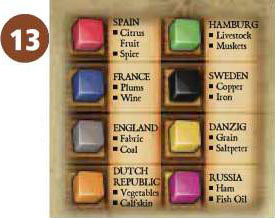 Each player starts with one cube of each color. |
The Travel Phase
As the Travel phase is the most important part of the game, it gets an even more detailed description here. After choosing a location for the turn, the active player does the following actions:
1. Taking Goods
If the current location is a Major location, the active player takes all cubes that have accumulated there and converts them into goods by placing them onto the office board into storage or depot areas. Each good has a distinctive space on the board.
Minor locations do not offer goods.
- If a player gets exactly 1 cube, it can be converted into either of the two possible goods.
- If a player gets exactly 2 cubes, they must be converted into 1 each of the possible goods
14. - If the player gets mone than 2 cubes, the distribution between both types of goods is arbitrary as long as at least one of each type of good is created.
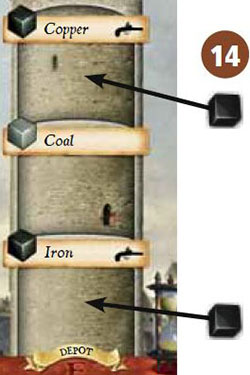
If the player gets 2 black cubes in Sweden, 1 will be Copper, 1 will be Iron.
It is not possible to put goods collected during this action back onto the Supply tile.
Additionally, the player gets 2 goods for each Bonus card showing the current location. These goods are placed on the appropriate space of the office 15.
If the player gets 2 black cubes in Sweden, 1 will be Copper, 1 will be Iron.
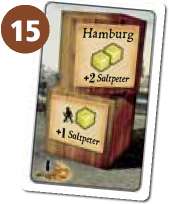
This Bonus card gives the player 2 yellow cubes that must be placed on the Saltpeter space, for each visit to Hamburg.
2. Distribute New Goods
Depending on the travel location, new goods are placed on some or all Major locations. Each location always gets cubes of its own color.
-
f the current location is a Major location, 1 new cube is placed on each adjacent location. Locations are considered adjacent if they're connected by a line.
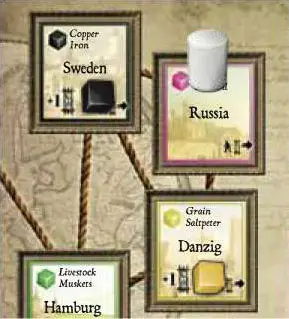
Example: Russia is the chosen location. New cubes are placed on Sweden and Danzig
-
If the current location is a Minor location, 1 new cube is placed on each Major location that already has at least the number of cubes that is depicted on that Minor location.
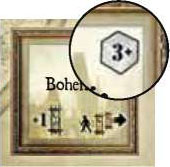
Example: Bohemia has 3+. If a player travels there, all Major locations that already have at least 3 cubes get another one. Newfoundland has 0+.
The supply of goods is unlimited. In the rare case where the approximately 40 cubes per color aren't sufficient, please use proxies
3. Time Counters
At some locations, the active player gets Time counters if traveling there. Those locations have a + sign next to the hourglass symbol.
 Choosing Sweden, Danzig, the Dutch Republic, Bohemia, and Denmark gives the player 1 Time counter, choosing Hamburg gives 2 Time counters.
Choosing Sweden, Danzig, the Dutch Republic, Bohemia, and Denmark gives the player 1 Time counter, choosing Hamburg gives 2 Time counters.These Time counters are taken from the Time chart. They are taken always from the topmost row that has Time counters left
A player gets these Time counters even if the location is the same one as the previous player had chosen.
At other locations, players have to pay Time counters if they travel there. These locations have a - sign next to the hourglass symbol. These counters are returned to the supply.
 Travelling to Spain costs 1 Time counter, Italy costs 2 Time counters, and Newfoundland costs 3 Time counters.
Travelling to Spain costs 1 Time counter, Italy costs 2 Time counters, and Newfoundland costs 3 Time counters.If a player doesn't have enough Time counters to travel to a location, another location must be chosen.
A player always has to pay Time counters to go to Spain, Italy, and Newfoundland - even if the previous player had chosen the same location (as it is considered a new travel).
4. Loss-of-goods Check
Whenever the last Time counter from any row is taken, the active player flips over that Time counter and reveals the letter(s) printed on it.
The letter indicates which storage or depot will suffer from a loss of goods
18. All players must return 1 good of their choice from the respective column of their office19. If the counter has a double letter, all players lose 2 goods of their choice from that column.The loss of goods applies to all players, not only to the player who triggered the check.
If there's just one letter on the counter, the player has the option to ignore the result and to flip over the first counter of the next row. That counter's letter(s) is (are) used instead. (The replacement counter then is put back on the time chart).
A player with no goods in the affected column doesn't have to give up any goods.
A player with just 1 good in the affected column only has to give up that good, even in the case of a double letter being flipped.
Cubes on the Supply tile are never affected by the loss-of-goods check.
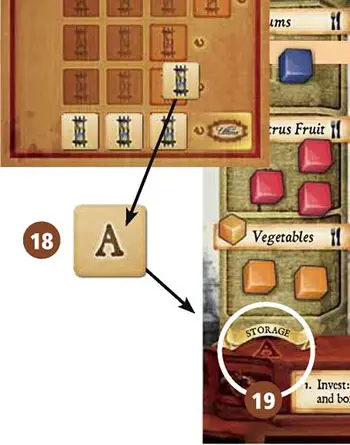
Final Round
The game ends with a final round, if one of the following two things happens:
-
a player fulfills a value 10 Contract
20, thus earning the Peace of Westphalia card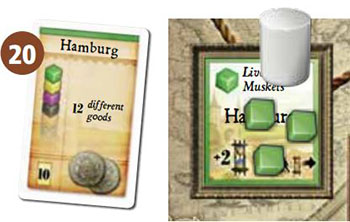
One of the four value 10 Contracts asks for 12 different goods delivered to Hamburg. The Hamburg goods Cattle and Muskets may be among those.
-
the last Time counter is taken from the time chart (If a player travels to Hamburg to take 2 Time counters, and there's just one left on the time chart, the second one is taken form the supply).
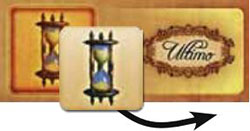
In this final round, each player has one more turn - including the player who triggered the final round.
- The Forced investment rule doesn't apply in this final round
- Players get Time counters from the supply
(If the final round was triggered by the last Time counter and later during the final round the Peace of Westphalia card is gained, this second condition teas no additional effect. This is also true if the Peace of Westphalia triggered the final round and during that round the last Time counter is taken).
End of the Game
After the final round, scores are tallied. The player with the most VP wins the game. A player with more than 5 Contracts places the 5 most valuable ones (including the Peace of Westphalia card) onto his office board and the others next to it.
(As there are no forced investments in the final round, players can have more than 5 Contracts).
Each Contract placed on the office board scores its Taler value in VPs. That's even true for the Peace of Westphalia card that's worth 14 VPs.
Each additional Contract placed next to the office scores 1/2 VP per Taler value. (Use VPs, no rounding)
Each player gets the VPs shown on his Building cards.
For most buildings, the Victory Points depend on the amount of goods and Time counters the player has. Players can use their goods and Time counters to score for more than one Building card.
Cubes that are still on the Supply tile can still be moved onto the office board to help scoring some buildings.
Goods and Time counters have no VP value other than scoring on Building cards.
Coins and Bonus cards have no VP value.
The phrase "per type of good" means "per good the player has at least 1 unit of in storage/depot".
At the end of game, no 4:1 trades to improve a player's score are allowed. Players can trade 4:1 just to fulfill Contracts (see page 3).
In case of a tie, use Time counters as a tiebreaker.
Continue Reading

